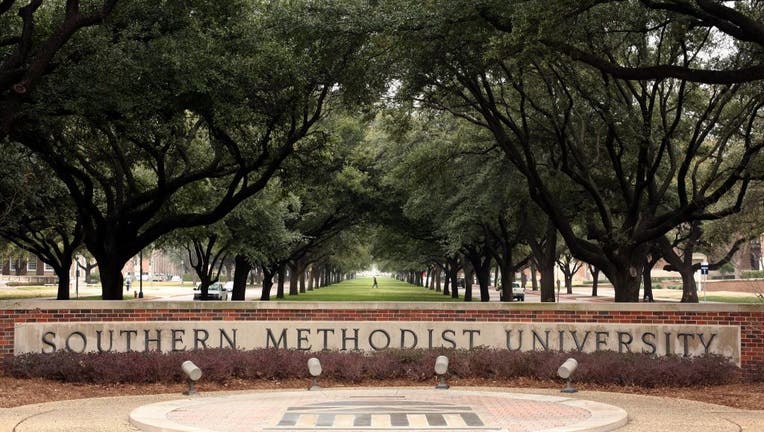Texas Supreme Court allows breach of contract case against SMU to continue

DALLAS - JANUARY 23: A student walks on the Southern Methodist University (SMU) campus January 23, 2007 in Dallas, Texas. (Photo by Brian Harkin/Getty Images)
AUSTIN, Texas - The Texas Supreme Court on Friday said it would allow a breach of contract case to continue against Southern Methodist University.
The university voted to split from the South Central Jurisdictional Conference in 2019.
Under the court's decision, the conference can proceed with its breach of contract challenge because it has a third-party interest in the school's articles of incorporation.
Citing the conference's rights in the university's 1996 articles, which were the last set of unchallenged articles, that SMU is "forever owned, maintained and controlled by" the conference and the article prohibited amending the articles without approval, the court found they had standing to challenge the 2019 articles that removed that language.
What they're saying:
"SMU’s unilateral amendment of the 1996 articles of incorporation obliterated all these rights and benefits, and more," Justice Debra Lehrmann wrote.
Lehrmann compared the case to a 2011 case where firefighters sued the city of Houston over a contract dispute with the firefighter's union.
Like the contract in that case, Lehrmann wrote that SMU's articles "conferring a variety of meaningful rights directly on the Conference, are at least as clear and unequivocal as the statements in the contract at issue" in that case.
The court did not issue an opinion on who is right in the case.
The case now shifts back to the lower courts.
Friday afternoon, SCJC released a statement on the court's decision that reads in part:
"Today’s favorable opinion from the Court supports our original position that SMU must seek the approval of the SCJ when making changes to its amendments.
"Our desire is to see this matter brought to a peaceful resolution so that our historic connection to the University can be fruitfully maintained for future generations."
SCJC v. SMU
The university has been locked in a legal battle with the church since SMU's Board of Trustees voted in 2019 to amend the school's articles of incorporation.
The move came after the church voted to keep its ban on recognizing same-sex marriages and ordaining clergy who are members of the LGBTQ community.
In those amendments, SMU clarified that the school was only managed by the board of trustees.
The amended articles sought to clarify that the school was a separate entity from the church.
The 2019 articles removed language from the 1996 articles that said the school was owned, maintained and controlled by the church.
During January's oral arguments, Justice Brett Busby questioned SMU's attorneys, seeming to disagree that the school could amend their articles without the church's approval.
The backstory:
The university's founding articles of incorporation stated the school would be owned, maintained and controlled by the South Central Jurisdictional Conference and that the conference had the right to approve all amendments.
In 2019, the university's board of trustees amended the articles to remove those provisions without the approval of the conference and filed a sworn certificate with the Secretary of State's office.
The move away from the United Methodist Church brought a lawsuit from the South Central Jurisdictional Conference, who claimed the amendments were invalid since they were not approved by the conference.
They argued that the property the school was built on belonged to the conference.
The conference amended its argument to claim the university had breached its contract with the conference and breached its fiduciary duties as they financially damaged the conference, citing a Texas law that would allow them to recover losses because the university filed the new amendments with the Secretary of State.
All the claims made by the conference were dismissed by a trial court.
The judgment was appealed to the Fifth Circuit Court of Appeals, who reversed the breach of contract decision.
The appeals court said the decision could be challenged in court under the Business Operation's Code and that both statements of opinion and fact could be actionable as materially false filings and damages can be recovered for losses caused by those filings.
The university filed an appeal to the Texas Supreme Court claiming the court went around the state’s rules on who can make an "ultra vires" claim.
An ultra vires claim is a claim that a corporation or government has acted outside its legal authority.
In Texas, only shareholders, the entity or the attorney general can make such claims against an entity.
SMU claimed the conference falls outside those rules because they do not have a stake in the university.
Attorneys for the university said the court was the first to say a non-member nonprofit’s articles of incorporation were a binding contract for the purpose of a breach of contract claim.
In a filing with the Supreme Court, SMU’s attorneys said the appeals court "disregarded a longstanding precedent that a legal opinion can’t be ‘materially false’ or give rise to damages where there’s no cognizable harm."
By the numbers:
The SCJC covers eight states, Arkansas, Kansas, Louisiana, Missouri, Nebraska, New Mexico, Oklahoma and Texas, according to their website.
Beyond SMU, the conference operates the Lydia Patterson Institute in El Paso and Saint Paul School of Theology with locations in Leawood, Kansas, and Oklahoma City.
SMU's website says more than 12,000 students attend the Dallas institution.
The Source: Information on the Texas Supreme Court's decision comes from their opinion published on June 27, 2025. Backstory on the case comes from previous FOX 4 reporting and court documents.

